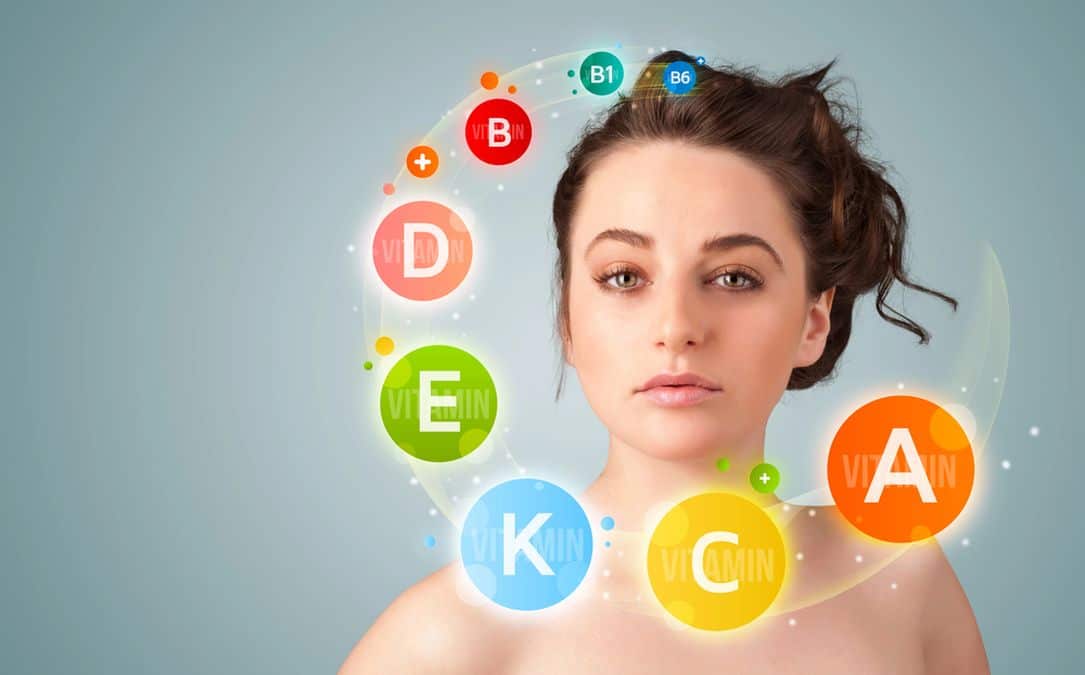
Hypervitaminosis, or the health effects of excess vitamins
Vitamins are nutritional compounds essential for our health, which we need to provide to the body every day. This will help to minimize the risk of developing many dangerous diseases or to alleviate symptoms and support the treatment of existing ones. At the same time, when supplementing vitamins, we must remember to follow their recommended dosage and never exceed it. If we do not see to this, we have to reckon with the consequences of hypervitaminosis, i.e. vitamin overdose.
Contents
Why should we take care of the right amount of vitamins?

Vitamins are complex organic compounds that were first discovered by a Pole, Kazimierz Funk, precisely vitamin B1, or thiamine. Nowadays we know many more of them, and know that they are even essential for the proper functioning of the organs and internal systems of the human body.
We divide the known vitamins into two groups, depending on what they dissolve in into:
- water-soluble, which include B vitamins and vitamin C;
- fat-soluble, and this group includes vitamin A, vitamin D, vitamin E and vitamin K.
You will find descriptions of specific vitamins in our previous posts, but it is worth mentioning again the most important functions they perform. They are responsible for, among other things:
- the work of the cardiovascular system;
- Blood clotting and its proper flow;
- metabolic and digestive processes;
- antioxidant activity, removing pathogenic free radicals;
- preservation of good eyesight;
- functioning of the brain and nervous system;
- good memory, concentration and cognitive abilities;
- regulation of the body’s hormonal balance;
- support of natural immunity;
- synthesis of collagen essential for skin health;
- firmness, elasticity and proper hydration of the skin;
- absence of skin discoloration and acne.
What is hypervitaminosis and how can it occur?
These are, of course, only some of the health-promoting effects of maintaining adequate vitamin levels. They depend not only on their type, but also on the aforementioned proper dosage, as recommended by specialists. A possible deficiency of vitamins can be quickly dealt with by supplying them in larger quantities.
Just as dangerous a situation is their overdose, or hypervitaminosis. Unfortunately, there is still a misconception that vitamins cannot be overdosed, so many people combine a vitamin-rich diet with uncontrolled use of dietary supplements. This carries serious consequences, which are worth learning more about.
How serious a health risk is an overdose of vitamins?

Hypervitaminosis is difficult to diagnose unequivocally, and depends, among other things, on the type of vitamin we have provided too much of. However, it does produce several common, characteristic symptoms, primarily involving the digestive system, such as:
- nausea;
- vomiting;
- diarrhea;
- severe abdominal pain;
- appetite disorders, lack of appetite.
These are general symptoms, and it is also necessary to know a more precise division of them depending on which vitamin we have an excess of in the body. This division is presented by experts as follows:
Hypervitaminosis of vitamin A
Mixtures of several chemical compounds, so-called carotenoids, which together form just vitamin A, also called retinol or beta-carotene. Its proper daily doses help prevent “chicken blindness”, protect against cancer, strengthen hair, skin and nails, while excesses cause characteristic bothersome symptoms:
- headaches, muscle and joint pain;
- irritability, severe nervousness and hyperactivity;
- a constant feeling of fatigue, physical and mental;
- risk of bleeding from the gums;
- convulsions;
- nausea and vomiting;
- itching and burning of the skin;
- photophobia;
- possible enlargement of internal organs, especially the spleen and liver.
B vitamin hypervitaminosis
Numerous vitamins included in this broad group are even essential for full health, which is why it is so important to avoid overdosing, which in the case of individual vitamins can lead to:
- thiamine, vitamin B1, severe headaches, cardiac arrhythmias, endocrine problems, primarily the secretion of the right amounts of insulin;
- riboflavin, vitamin B2, vomiting and digestive problems, higher susceptibility to the effects of oxidative stress;
- niacin, vitamin B3, liver disorders, arrhythmia, itchy skin, increased blood sugar, difficulty regulating blood pressure and increased LDL cholesterol;
- Pantothenic acid, vitamin B5, poorly functioning digestive system, risk of severe allergies, interference with neurotransmitter synthesis;
- pyridoxine, vitamin B6, increasing nervous system problems, weakened immunity and less efficient metabolism;
- folic acid, vitamin B9, also abnormal work of the nervous system, difficulties with cell growth, higher susceptibility of the skin to negative effects of external factors.
Hypervitaminosis of vitamin C
Vitamin C, also known as ascorbic acid, is one of the most important in the human body, a powerful antioxidant that facilitates the removal of excess free radicals. However, supplying too much of it is associated with an increased risk of a number of serious ailments, and can cause, among other things:
- problems with the functioning of the digestive system;
- nausea and abdominal pain;
- vomiting;
- difficult-to-control diarrhea that threatens to dehydrate the body;
- increased need to urinate;
- risk of developing kidney stones;
- allergic reactions, usually skin reactions;
- interference with the effects of certain groups of drugs.
Hypervitaminosis of vitamin D
The scope of vitamin D’s responsibilities is extremely wide; among other things, it determines the maintenance of a strong and resistant bone structure, supports and regulates the absorption of calcium from the intestines, takes care of the mineralization of teeth, regulates blood pressure and insulin secretion. However, its excess has negative consequences and can lead to:
- noticeable muscle weakness;
- a higher risk of cardiovascular disease;
- the possibility of developing other conditions, including diabetes, multiple sclerosis or rheumatoid arthritis;
- difficulty concentrating;
- polyuria;
- constant feelings of lethargy and apathy;
- vomiting, diarrhea and constipation;
- a general feeling of weakness in the body;
- calcification in the lungs, kidneys and even the heart.
Vitamin E hypervitaminosis
VitaminE has fully earned its colloquial name “the vitamin of youth,” as it is characterized by its powerful effects that promote the health and appearance of the skin and hair. In addition, it is effective against cardiovascular diseases and has antioxidant effects. It is also called the “fertility vitamin”, as it has a beneficial effect on reproductive abilities, but an overdose of it causes:
- a constant feeling of fatigue;
- muscle weakness;
- reduced blood clotting;
- disorders of the digestive system, diarrhea and painful constipation;
- headaches of high intensity;
- deterioration of vision.
Hypervitaminosis of vitamin K
Vitamin K is also made up of a larger group of chemical compounds is fat-soluble, regulates the body’s calcium balance, so it strengthens bones and teeth. In addition, it improves the heart and circulatory system, takes care of the efficiency of the nervous system, improves the appearance of the skin, preventing various skin disorders. In this case, too, we must avoid overdosing, which results in:
- heart muscle pain;
- violent hot attacks;
- blood pressure spikes;
- increased blood clotting posing a risk of venous congestion;
- liver dysfunction and pain;
- hemolysis, or uncontrolled breakdown of red blood cells.
How can hypervitaminosis be counteracted?
The first thing to do if you notice the symptoms outlined above in yourself is to contact your doctor, who should order laboratory tests that can detect whether you have too many vitamins in your body. Based on this, he or she may order adherence to an appropriate diet with fewer of the vitamins we have in excess, and usually prohibit the consumption of dietary supplements containing them.
Sources:
- https://www.healthline.com/nutrition/vitamin-a
- https://www.healthline.com/nutrition/thiamine-deficiency-symptoms
- https://www.healthline.com/health/vitamin-watch-what-does-b2-do
- https://www.healthline.com/nutrition/niacin-benefits
- https://www.healthline.com/health/vitamin-watch-what-does-b5-do
- https://www.healthline.com/nutrition/vitamin-b6-benefits
- https://www.healthline.com/nutrition/folic-acid
- https://www.healthline.com/nutrition/vitamin-b12-benefits
- https://www.healthline.com/nutrition/vitamin-c-benefits
- https://www.healthline.com/health/food-nutrition/benefits-vitamin-d
- https://www.healthline.com/health/all-about-vitamin-e
- https://www.healthline.com/health/vitamin-k



